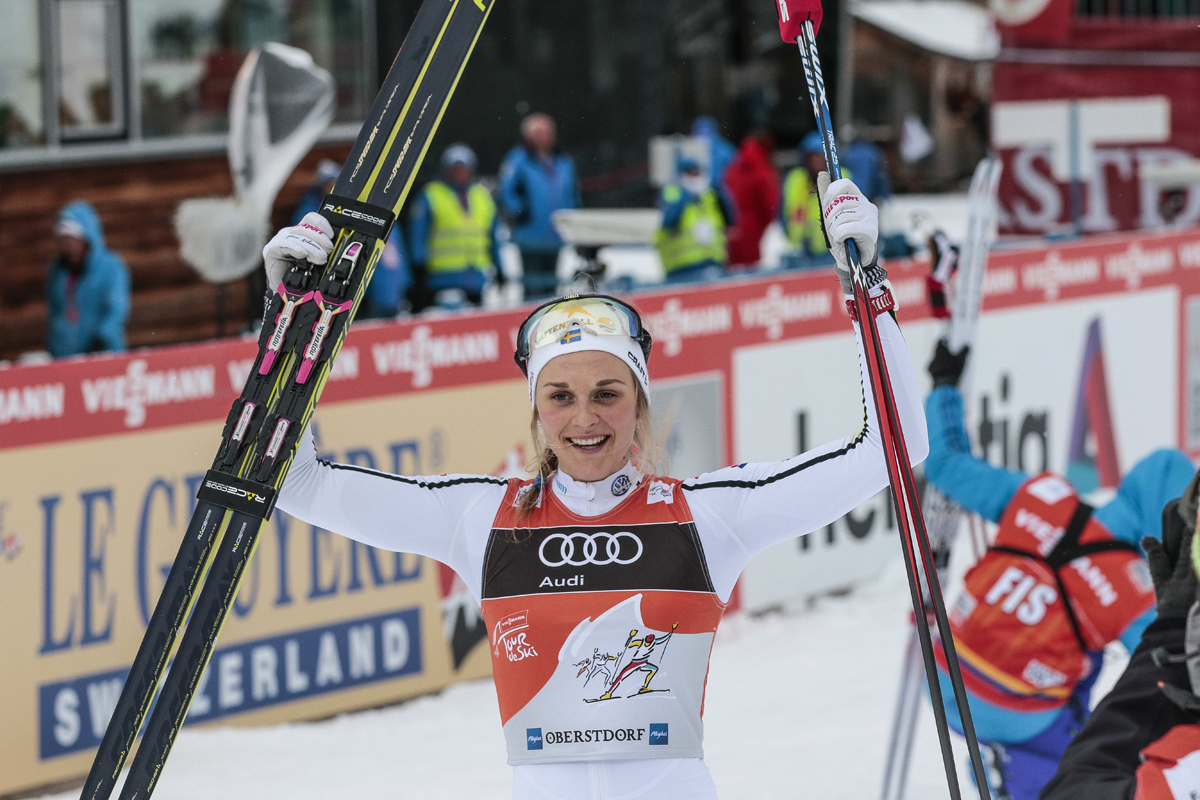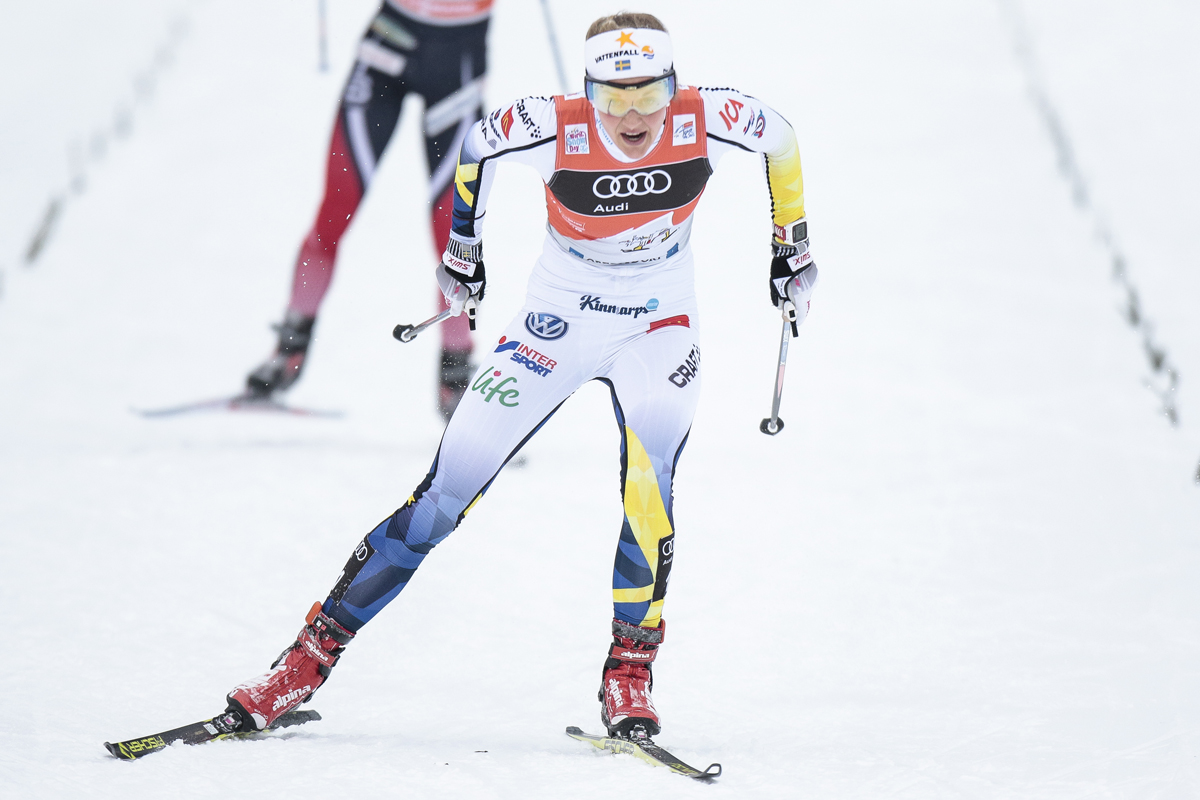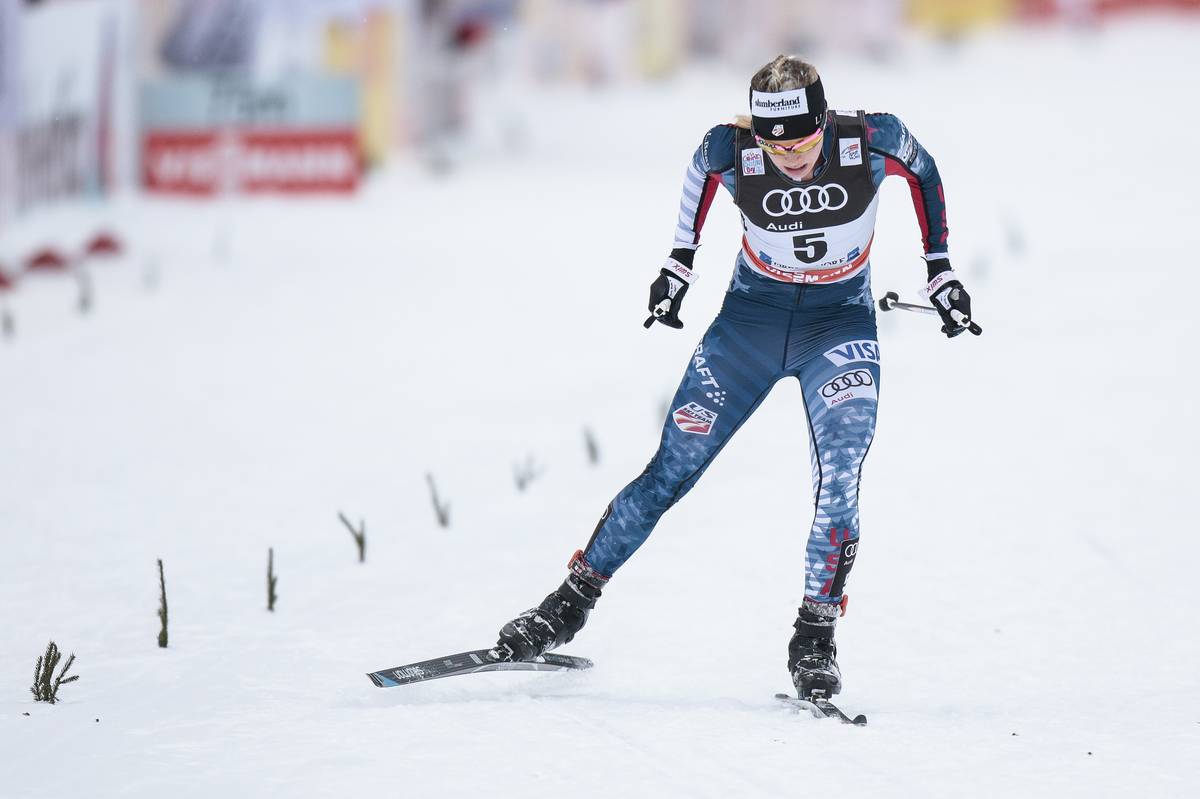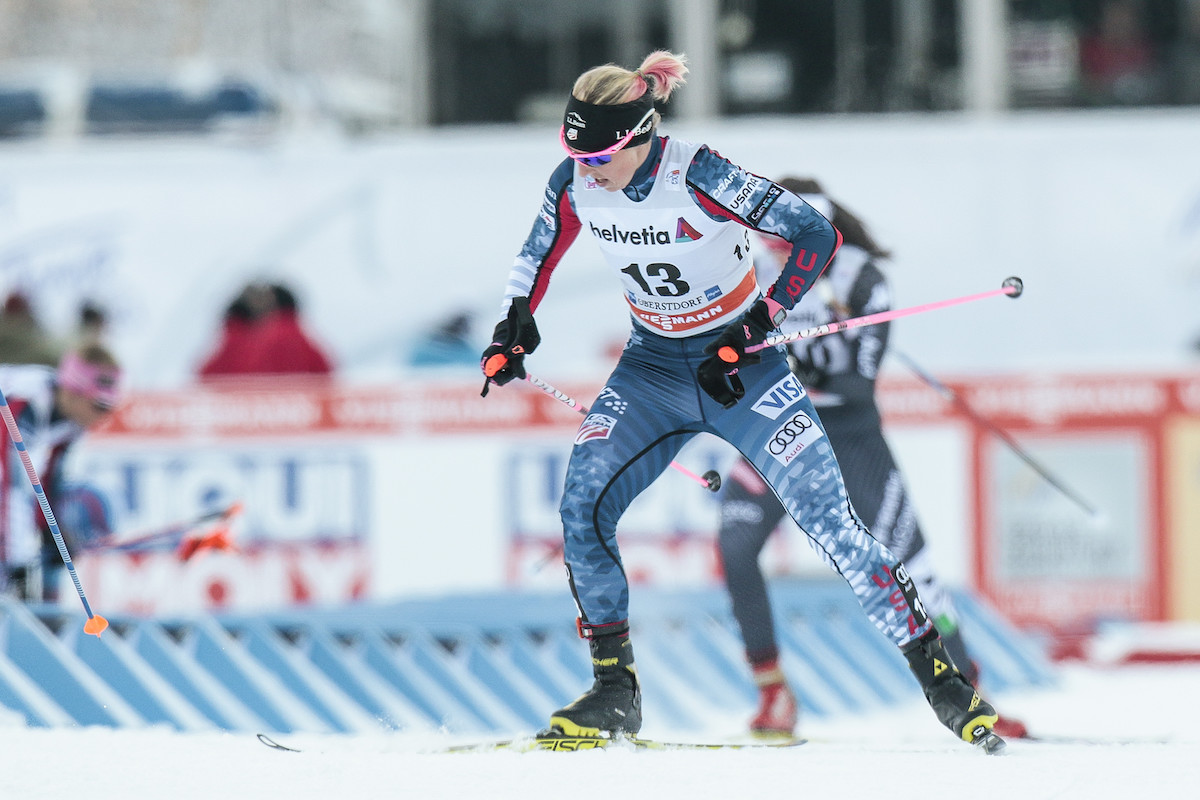
The immovable object that is the Norwegian women’s ski team may finally have met an unstoppable force: 23-year-old Swede Stina Nilsson.
Norway’s stars Heidi Weng and Ingvild Flugstad Østberg skied with Nilsson for most of Wednesday’s 10 kilometer freestyle pursuit, the fourth stage of this year’s Tour de Ski. But in the end Nilsson came flying off the final downhill in Oberstdorf, Germany, in exactly the same position she had the previous day: first place.
“It is amazing to win again here in Oberstdorf,” she told FIS.
It took part of the first lap for the Norwegians to catch Nilsson. The Swede started with a four-second advantage over Weng and another eight seconds on Østberg.
Østberg quickly caught her teammate. The pair worked together to ski up to Nilsson, who led them around the rest of the 2.5 k loop before pulling aside at the lap marker and asking someone else to lead.
Nilsson appeared to lose a little on some of the uphills, but always caught up easily going down the other side. Her skis were demonstrably faster than those of either Norwegian.
Weng and Østberg occasionally asked her to lead, but Nilsson deferred.
But the Norwegian duo didn’t exactly share the burden of leading. Østberg did most of the work while Weng followed.
“I realized pretty quickly that the other two were not so interested in leading,” Østberg told Norwegian broadcaster NRK. “I hoped they would take some. But somehow there wasn’t a meter to be gotten from Stina and Heidi.”
“Ingvild did an amazing job today,” Weng told FIS. “She was in the front most of the time.”
She later told NRK that the “struggled at the back” almost the whole way in their three-woman pack, and could “just barely keep up.”
And with a windy snowstorm gathering in the German mountain town, being the tip of the spear wasn’t a popular position.
“We almost got blown away by the wind a few times,” seventh-place Nathalie von Siebenthal told Switzerland’s SRF broadcaster.
After sticking with the Norwegians all race and knowing that she had fast skis, Nilsson raced confidently on the last lap.
“My tactic was not to be in the front– I wanted to be in a good position before the last downhill,” she told FIS.
Østberg pushed hard to get away from the other two on the final climb, and a tiny bit of daylight emerged between her and Weng. But Nilsson managed to stay just on Weng’s tails.
On the course’s final up-and-over blip, she sailed past Østberg and secured the inside lane coming.

“Stina is insanely strong at the end and she knows it,” Østberg told Swedish news service Expressen. “She wants to play her strong cards, it’s understandable… I did not get much help [at the front]. But there was nothing wrong with what Heidi and Stina did. One must go as they want.”
Nilsson opened up a solid lead in the final meters. Weng (+1.2) outsprinted Østberg (+1.8) for second place.
Krista Parmakoski of Finland held on to fourth after skiing the whole race by herself. She initially closed some time on the leaders, but as their race heated up in the final lap she slipped back. The Finn eventually finished 42.4 seconds back.
To add insult to injury, the bonus seconds awarded to the first three women across the line mean that she is now actually even farther – 57.4 seconds – behind in the overall Tour de Ski standings.
Parmakoski argued that bonus seconds in pursuits should be awarded to the fastest “time of the day.” She believes the current system gives too much advantage to those who are already winning.
“It was a tough competition [for me],” she told Finland’s Iltalehti news service, according to a translation. “It was a tougher performance than for the front three… I had the wind gusts alone.”
But a different bonus structure wouldn’t have changed her ranking on Wednesday. Østberg, Weng, and Nilsson had the fastest ski times of the day, in that order.
Diggins and Bjornsen Maintain Positions

Four members of the U.S. team had top-12 results in either the final pursuit standings or the time-of-the-day results. And they got there in a lot of different ways.
Jessie Diggins, coming off a podium in the skiathlon, started and finished in fifth place. She was unable to make up any time on the leaders or fourth-place Parmakoski.
“Today wasn’t a great day for me, but that’s why it’s a stop on the Tour- you keep going and you never know when it’s going to be your day!” she wrote in an email. “I skied completely alone the entire race and with the gusts of wind it would have been a good day to be able to team up and work together with other skiers, but that’s just how it is sometimes!”
Diggins actually slipped back considerably, and now sits 2:02.5 behind Nilsson in the overall rankings.
“I also think we missed a little something on her skis,” U.S. Ski Team coach Jason Cork said in a USSA press release, before concluding on an optimistic note. “But we have a rest day tomorrow and the course at Toblach [Italy] is a favorite of hers. The weather is cold and that’s something she thrives in.”
Despite a bit of disappointment, the fifth-place spot is secure for now. Diggins is 51.6 seconds ahead of Germany’s Nicole Fessel in the Tour standings going into Friday’s 5 k skate.
“Looking forward to Toblach as I really love that venue!” Diggins wrote.
For Sadie Bjornsen – who started 11th and finished 12th – a slip from the previous day’s stellar results also didn’t lose her an advantageous position in the overall Tour standings.
“I am excited to still be in a good place in the Tour, and I can’t wait for an individual start here in Toblach,” Bjornsen wrote in an email. “We are just now getting to the exciting part when everyone starts getting a little tired!”
Bjornsen started out early in a pack with Fessel and several others. But on the second of four trips of the 35-meter-tall Burgstall hill, Fessel, Switzerland’s Nathalie Von Siebenthal, and Russia’s Yulia Tchekaleva made a break and left the rest of the chase pack in the dust.
Bjornsen was trapped behind another struggling skier, and couldn’t cover their move.
“It was a fine effort today,” she wrote. “But I feel like had I been in a better position to go with Nicole and Yulia, that would have been ideal.”
Fast Pursuits by Randall and Stephen
Two other Americans, Liz Stephen and Kikkan Randall, clocked particularly fast isolated pursuit times.

Randall fairly quickly closed the gap to the group Bjornsen was skiing in.
“I was starting just a few seconds behind [Sweden’s] Charlotte Kalla and a couple other skiers, So I made a big effort right away to link up with those girls,” Randall explained. “Then we were a pack of five, I think, so I was able to just sit in the pack and work and get my rhythm.”
Stephen later caught up as well. She had come into the day 3:53 back from the leaders, but started as part of a wave of skiers at three minutes after Nilsson.
“Honestly, starting from a wave was the most mellow mass start all season,” Stephen laughed. “It went pretty smoothly and it was a really fun race. The courses here in Obertsdorf were really wide today because we didn’t have to have the classic tracks [on the side] as well, so there were plenty of opportunities to move if you wanted to.”
The wind, however, was certainly a factor in deciding when and where she could make her moves.
“There was a lot of having to draft. It was definitely a very engaging race where you needed to stay close to the person ahead of you,” Stephen said. “If you were trying to bridge some gaps, it was definitely a challenge. But I felt I was able to give a full effort. It took me maybe a lap and a half to bridge to Sadie and Kikkan’s group. That was a bit frustrating, but we did it and once we caught that group, they were working hard… I could ski the way I would have skied, basically, if I was by myself.”
Stephen had essentially received a 53-second time credit at the start of the race. She lost those seconds back again at the finish. Stephen is now 26th in the Tour, despite crossing the line a few places higher up.
Randall had the 11th-fastest time, and was able to jump from 19th to tenth.
The Tour de Ski has proved a turning point for Randall’s season. She failed to crack the top-30 in the first period of World Cup racing – her first competitions back after taking a year off to have a baby. But Randall hasn’t been out of the top-30 since the seven-stage series started.
“It’s really cool to do these back to back races, because whether it goes well, or not well, you get another chance the next day,” she said. “I had some good feelings in the skate portion of the race yesterday, and I was looking forward to today. My results so far in the tour set me up really well today.”
Out of the big pack that included Bjornsen, Stephen and others, Randall was able to lead across the line.
“I had good energy and made a big move on the final climb and kind of got to the front of the train,” Randall said. “I was happy to have that extra gear at the end of the race. All the back to back racing has been helping me sharpen my race form, and get the race feelings back.”
“Getting to watch Kikkan and Sadie make a move on that last uphill…” Stephen mused. “Almost nobody could stay with that, and I just certainly had nothing for it. It was really fun to watch that happen. Especially for Kikkan. She hasn’t had the season that she’s wanted yet and is racing herself back into form. It was just fun to see the old Kikkan come back. There’s a lot more to come.”
Rosie Brennan started and finished 42nd. She is 7:47.9 behind Nilsson in the Tour standings.
Pursuit results | Tour standings (through Stage 4) | Time of day
Chelsea Little
Chelsea Little is FasterSkier's Editor-At-Large. A former racer at Ford Sayre, Dartmouth College and the Craftsbury Green Racing Project, she is a PhD candidate in aquatic ecology in the @Altermatt_lab at Eawag, the Swiss Federal Institute of Aquatic Science and Technology in Zurich, Switzerland. You can follow her on twitter @ChelskiLittle.



